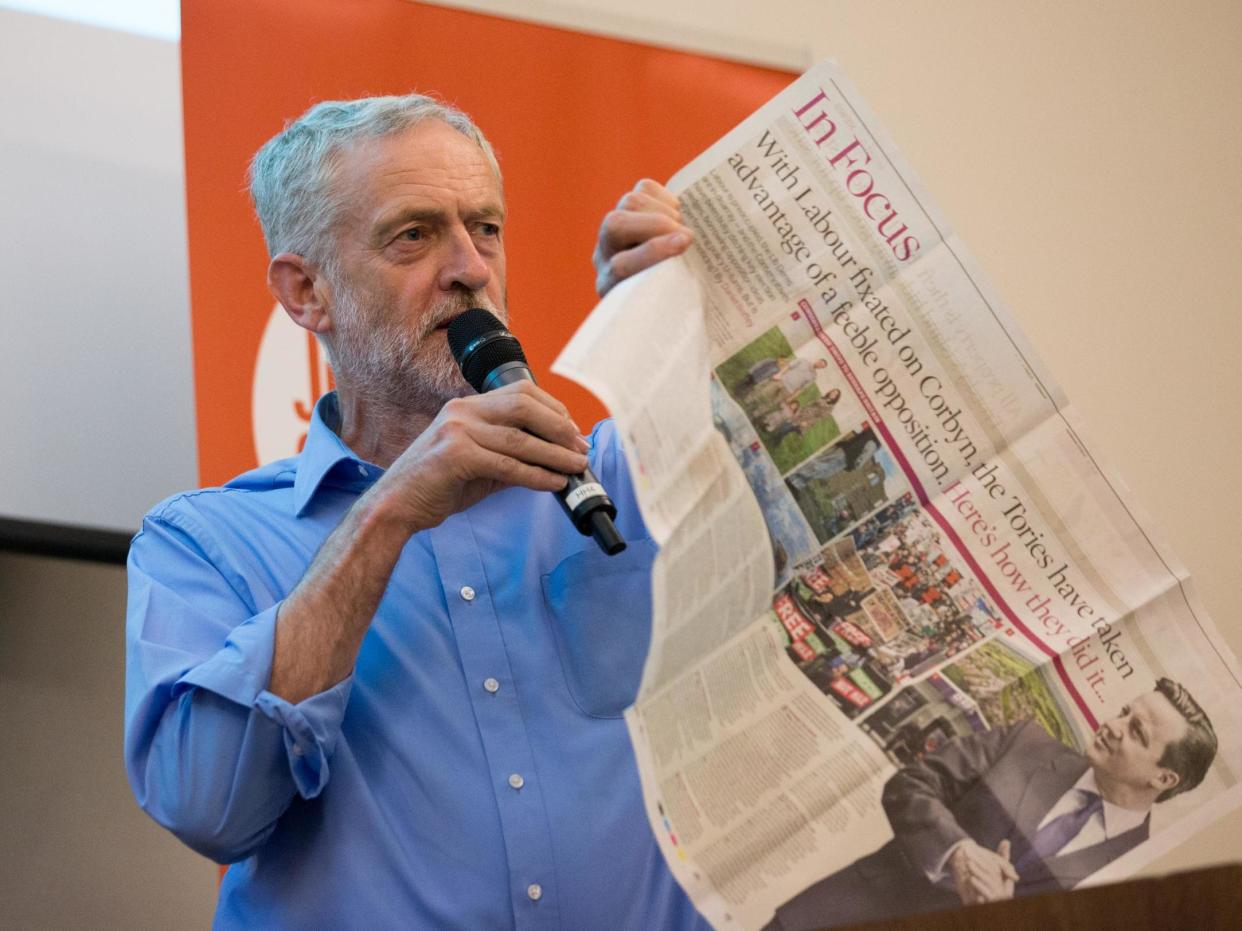Boris Johnson adviser says newspaper attacks on Labour have been ‘full on from the off this time’

A special adviser to Boris Johnson has suggested some of Britain’s biggest selling newspapers have chosen to begin an onslaught against Jeremy Corbyn earlier than was the case before the previous general election.
Tim Montgomerie, who advises the prime minister on social justice issues, said attacks on the Labour leader from publications including the Daily Mail had been “full on from the off” when compared to the 2017 national vote.
In a rare tacit admission from a prominent Conservative figure that “the big newspapers” have an anti-Labour stance, he wrote on Twitter: “At the last election the big newspapers only really attacked Labour at the eleventh hour – after Corbyn’s poll took everyone by surprise.
“This time? It’s been full on from the off.”
Mr Montgomerie, founder and erstwhile editor of the influential ConservativeHome website, illustrated his observation with the Daily Mail’s Friday front page.
The paper led with an article declaring Mr Corbyn was “condemned by his own candidates”, unearthing historic remarks made by prospective Labour MPs criticising their party leader. The Daily Mail did not respond to a request for comment.
While Mr Montgomerie observed that during the snap election called by Theresa May, attacks on Labour increased “at the eleventh hour”, research suggests hostility existed to a “problematic” extent during Mr Corbyn’s first days as Labour’s premier.
Analysis of media coverage during the month of Mr Corbyn’s election as leader in 2015 by London School of Economics found that across 812 articles by eight national newspapers, 75 per cent of stories about Mr Corbyn either distorted or failed to represent his actual views on subjects.
Dr Bart Cammaerts, the project director, described “an overall picture of most newspapers systematically vilifying the leader of the biggest opposition party, assassinating his character, ridiculing his personality and delegitimising his ideas and politics”.
He concluded: “Our analysis shows that Corbyn was thoroughly delegitimised as a political actor from the moment he became a prominent candidate and even more so after he was elected as party leader.
“Denying such an important political actor a voice or distorting his views and ideas through the exercise of mediated power is highly problematic.”
Analysis by researchers at Loughborough University of print coverage in the run-up to the 2017 general election also found that, while no party achieved net positive coverage without weighting the papers by circulation, Labour received the most negative overall coverage by a considerable margin.
At the last election the big newspapers only really attacked Labour at the eleventh hour – after Corbyn’s poll took everyone by surprise. This time? It’s been full on from the off. https://t.co/GJHoG9xcFE
— Tim Montgomerie (@montie)
Despite the onslaught of negative press, Labour’s performance was likely bolstered by a slick social media presence, driven by Momentum. Some commentators suggested the hung parliament result could hint at a decline in the omnipotence of print media – a sentiment echoed by key Labour figures.
At Labour’s annual conference in Brighton in September, John McDonnell said he was prepared for the “full weight, the whole kitchen sink of the media, the Tory press, the gutter press thrown at us”, The Guardian reported.
Mr McDonnell added that social media made newspapers “irrelevant”, according to the paper.
Days earlier, Mr Corbyn released a video criticising a lack of scrutiny of accusations that Boris Johnson had misused public funds as the mayor of London.
“This is how the establishment works,” Mr Corbyn said of his perceived imbalance in reporting on the subject. “They close ranks, they put privilege first. Things have to change.”
In October, government officials ruled a £100,000 grant awarded to a cyber firm owned by Mr Johnson’s friend Jennifer Arcuri was “appropriate”. Labour’s former deputy Tom Watson branded the decision “a whitewash”.
Left-wing commentator Ash Sarkar described Mr Montgomerie’s comments on Twitter as an admission that “the press is biased against Labour ... they’re attacking Corbyn because they’re scared he can win”.
Mr Montgomerie rose to prominence in 2004, after Iain Duncan Smith, Philippa Stroud and he co-founded the Centre for Social Justice, a centre-right think tank which played a role in crafting Conservative policies such as Housing First and Universal Credit.
He was appointed Mr Johnson’s special adviser on social justice in September.
Read more
Boris Johnson can’t even be trusted to insult Jeremy Corbyn properly
When will the left stop fetishising socialism in Latin America?

 Yahoo News
Yahoo News 
